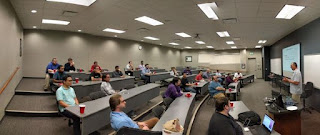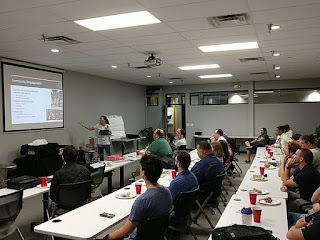This is a fairly poignant issue for many technical community leaders who feel alone in what can be a thankless job. Let's talk about some guidance and tips for fostering and farming fellow volunteers from the user community. As a user group leader for 10+ years myself, and also the spouse of the leader of a successful local activism startup, I hope to share some wisdom here. I welcome any additional feedback from the host of technical user group leaders as well.
I presented these ideas at PASS Summit's Local Group leaders meeting on 11/5/2019.
- Enthusiasm is the primary job qualification. Period.
- For any nonprofit, for any volunteer organization, enthusiasm is always the number one criteria.
- Nice to haves:
- Good written and verbal communication skills.
- Reliable transportation and attendance.
- Willingness to spend time sending emails and following up.
- Someone with a network of connections in the technical or local community.
- But really, without enthusiasm, this all falls apart.
- Understand that people get involved in nonprofits for different reasons.
- Some people just want to help, not lead.
- Some people will want to eventually lead. Both are OK and you should encourage either.
- Some people will want to volunteer to meet, to network, to further their career. That's ok too.
- Some folks may be too shy to ask to be involved, or not sure of the protocol. Make sure you regularly announce that you're looking to add more volunteer leaders to the organization, and if necessary, reach out and ask someone. They may be honored to be asked!
 |
| Baton Rouge UG meeting |
- Creative, heuristic work is more motivational than strict directions. You don't have to provide detailed, step by step instructions or standard operating procedures to people. In fact, you shouldn't. That can actually be stifling to enthusiasm.
- Provide details on outcomes and maybe things like frequency or timing.
- Give volunteers tasks, let them own it. Make sure everyone knows what they should do, but let them create, with support and followup and encouragement on your part.
- A leader in a volunteer organization doesn't bark orders. Again, ask volunteers do tasks where they can feel ownership, so that they can feel empowered. Creative, even.
- As a leader, you are setting the norms for board membership, setting the bar for what leadership looks like. This looks like hounding sponsors, speakers, sending emails, updating websites, proactively planning, etc., the things you're already been doing.
- When you lead by example cleaning up garbage or a spill, enthusiastic volunteers will see this and follow suit. You've defined the behavior of a leader in this org.
- When it's something easy, simple, or right in front of you, don't delegate it, do it yourself.
- For example, everyone's job is garbage cleanup duty afterwards, or clean up a spill. Everyone's job is to get their own coffee and lunch. Everyone's job is to move things with a hand truck.
- Stop using any personal or work emails to conduct User Group business. Get organized with shared online tools like a shared group accounts for sending emails, online docs, shared calendars.
- Share relationship contact info for food vendors, facility contacts. Communicate regularly.
- Part of that empowering of your volunteers is going to include listening to their suggestions to change the way things are done, the way things YOU have been doing them. Part of leading a volunteer org is trying out their ideas, and part of fostering fellow volunteer leaders is allowing their ideas to come to fruition.
| Some of the Baton Rouge UG Organizers at SQLSatBR |
- Someone who thinks they're too cool to show enthusiasm, either doesn't have enthusiasm, or hasn't been prompted to show it. Make sure you show enthusiasm that is contagious.
- People who want to lead after their first meeting... great enthusiasm! But maybe don't assign critical group tasks until they have participated regularly.
- Anyone familiar with the term "slackivist"? The social media sharer and retweeter makes for a great member, but generating that content and showing up to the meetings is what makes for a great future user group leader. A good future user group leader attends, speaks, volunteers, helps move things and be places in addition to being a social media megaphone.
- Don't throw too much at a new volunteer, regardless of enthusiasm level. Make sure they feel part of a team, not that you are dumping all the workload on them. The internal and external perception should be that a new volunteer is joining the team, with all the benefits of teamwork therein.

